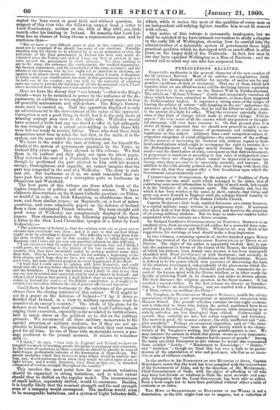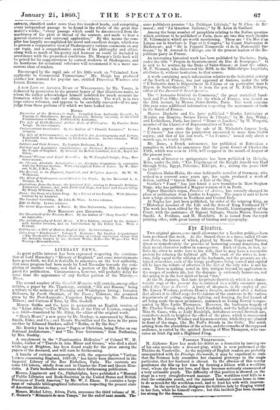PUBLICATIONS RECEIVED.
Respectable mediocrity is the general character of the new number of the QUARTERLY REVIEW. Most of its articles are compilations fairly executed, but distinguished neither for novelty of matter nor for any peculiar excellence of style or treatment. That one of them which best sustains what we are afraid we must call the declining literary reputation of the Quarterly is the paper on the Roman Wall in Northumberland. The article on "Reform Schemes " closely and temperately examines all those which have been submitted to Parliament, or have been suggested by Parliamentary leaders. It expresses a strong sense of the danger of leaving the subject of reform "still dangling in the air," and echoes the assurance given by Lord Derby, that he and his followers will not make it the pretext of a fight for office. What the reviewer especially depre- cates is that kind of change which leads to ulterior change. This he says is "the very worst of all the courses which any prudent or thought- ful statesman will ever have recourse to. On that ground alone it is above all things important that we should now proceed in such a man- ner as will give us some chance of permanence and stability in our legislation on this subject. Arbitrary lines—and occupation-values, ir- respective altogether of social obligations—the extension of the suffinge for the purpose of increasing the electoral roll, without regard to those local considerations which ought to accompany the right to exercise it— the disfranchisement of boroughs merely because they happen to be small—and the distribution of seats, consequent on that disfranchisement, in proportion to numbers or according to any rules of arithmetical com- putation—these are changes which cannot be deprecated in terms too strong, since they are sure to be uncertain, unstable, and insecure. In addition to the evils already pointed out, they must bring with them this one above all, that they cannot offer a firm foundation upon which the Government can permanently rest" UNDERCURRENTS OVERLOOKED, by the author of "Realities of Paris Life" wants the one small merit which belonged to the latter' that of containing some novel information in the midst of much trash, but equals it in the virulence of its sectarian spirit. The ultimate end, too, for which it has been written is the same to show, namely, that virtue and piety can never flourish in England mall she submits herself humbly to the teaching and guidance of the Roman Catholic Church.
Captain Brabazon's little book, entitled SOLDIERS AND THEIR SCIENCE, is a capital military essay, written in a perspicuous style. It traverses the whole field of war from the earliest times, and deserves the attention of all young military students. But we hope to make our readers better acquainted with its contents on a future occasion.
Sir Richard Gardiner's CONSIDERATIONS ON NATIONAL DEFENCE is an emphatic plea, from an experienced old soldier, for a powerful force com- posed of Regular soldiers and Militia. Whatever we may think of his suggestions, his warnings at least should make a deep impression.
In two volumes, containing upwards of twelve hundred pages, Remy Disdier has treated of the CONCILIATIOIC RATIONNELLE DU DROIT ET DU DEVOIR. The object of the author is apparently twofold : first, to sus- tain the argument in favour of the claims of the Beason, the infallibility of which has hitherto been denied only because it has been improperly identified with Mind (intelligence) or with Sentiment; and secondly, to show the futility of Pantheism, Catholicism and Protestantism. Reason is defined to be the power which man possesses of discovering the basis of the relations investigated, independently of the phenomena which dis- close them ; and, in its highest attainable perfection, represents the ac- cord of the human mind with the Divine intellect, or in other words the faculty of attaining Truth in its elements and under its diverse phases. The book discusses the religious question in the freest manner. It has reached a second edition. In the first volume we observe an Introduc- tion; a Preface ; an Avant-Propos ; and are startled with a Dedication, "A Dieu, comme tiu meilleur des Peres!"
Dr. Vaughan, in MEMORIALS or HARROW SUNDAYS recalls the solemn associations of fifteen years' preceptorial or ministerial connection with Harrow School. The present selection contains twenty-eight sermons, and is dedicated to those who during the period mentioned have been attendants in the school chapel. The discourses, while impressing us as strictly orthodox' are less theological than ethicaL Controversial or esoteric they certainly are not ; but rather expository and hortatory. The matter is good ; the manner earnest ; the style unaffected and "sim- plex munditiis." Perhaps an occasional expression, such as "the inter- stices of the thunderstorm," mars the plain beauty which is the charac- teristic of Dr. Vaughan's writing, but this grandiloquence is rare. We may instance the sermon in which this phrase occurs as very impressive. The subject is Silence "not the absence but the pause of speech." Among the many excellent Discourses in this volume we would also recommend those entitled "Levity ; " "Hindrances to Knowledge ;" " Habits •' " and " Ambition " ; though we think this last errs a little in its prettar- mission of the approbation of wise and good men, whether as an incen- tive or aim of virtuous conduct.
In the preface to his Naanarivz OF THE MI:mates IN OUDE, Captain Hutchinson states that the work has been compiled with the concurrence of the Government of India, and by the direction of Mr. Montgomery, Chief Commissioner of Oude, with the object of affording to all who may have lost friends or relations in Oude the most accurate and com- plete information that the Local Government has been able to collect Such a book might not to have been published without either a table of contents or an index.
THE MIND OF SHAKESPF.ARE AS EKRIBITED re- HIS WORKS is not A dissertation, as the title might lead one to suppose, but a collection of
extracts, classified under more than five hundred heads, and comprising every independent passage to be found in the whole of the great dra- matist's works ; "every passage which could be disconnected from the machinery of the plots or thread of the context, and made to bear a general character and universal application." By this means the com- piler has happily accomplished his novel and excellent design, which was to present a comparative view:of Shakespeare's various comments on any one topic, and a comprehensive system of his philosophy and ethics, along with so much of his poetry and humour as could be included in accordance with the prescribed conditions. Mr. Morgan's little book will be prized for its suggestiveness by earnest students of Shakespeare, and its handiness for occasional reference will recommend it to a more nu- merous class of readers.
Encouraged by- the rapid sale of his little work on "Criminal Law applicable to Commercial Transactions," Mr. Sleigh has produced another law manual for popular use, entitled PERSONAL WRONGS AND LEGAL REMEDIES.
A new LIFE OF Anrkra DOKE OF WELLINGTON, by Mr. Yonge, is dedicated by permission to the present bearer of that illustrious name, to whom the author acknowledges himself indebted for much accurate in- formation which he could not obtain elsewhere. The work is in two large octavo volumes, and appears to be carefully executed—if we may judge from those portions of it which we have looked into.
ROOKS.
Narrative of the Mutinies in Gude. Compiled from Authentic Records by Captain G. Hutchinson, Bengal Engineers, Military Secretary to the Chief Commissioner of Oude. Published by Authority.
The Life of Field-Marshal Arthur Duke of Wellington. By Charles Duke Youge. In two volumes.
Undercurrents Overlooked. By the Author of "Flemish Interiors." In two volumes.
The Life of Schkiermaeher, as unfolded in his Autobiography and Letters. Translated from the German by Frederica Rowan. In two volumes. With a Portrait.
•
Soldiers and their Science. By Captain Brabazon, R.A.
Political and Legislatire Considerations on National Defence : addressed to the People of England. By General Sir Robert Gardiner. G.C.B., Royal Ar- tillery.
Personal Wrongs and Legal Remedies. By W. Campbell Sleigh, Esq., Bar- rister-at-law, On Chronic Alcoholic Intoxication ; or, Alcoholic Stimulants in connexion with the Nervous System. With a Synoptical Table of Cases. By W. Mar- cet, M.D., F.R.S., The Revival, in its Physical, Psychical, and Religious Aspects. By W. M. Wilkinson.
The Mind of Shakesvearc as exhibited in his Works. By the Reverend A. A. Morgan, M.A.
Aspirations front the Inner, the Spiritual life, aiming to Reconcile Religion, Literature, Science, Art, with Faith and Hope, and Lore and Immortality. By Henry M'Cormac, M.D.
.Rana: the Story of a Little Frog. By a Friend of the Family. With lllustm- trations by an Amateur.
The Cousins' Courtship. By John R. Wise. In two volumes. Elfle in Sicily. In two volumes.
The Great Experiment. A Novel. By Miss Molesworth„ In three volumes.
NEW EDITIONS AND REPRINTS.
The Household of Sir Thomas More. By the Author of" Blary Powell." With
an Appendix.
The Autobiography of Leigh Hunt. A New Edition, revised by the Author with further revision, and an Introduction by his Eldest bon. With a Portrait.
Getting on : a Tale of Modern English Life. In two volumes.
Tales from "Blackwood." Volume 7. Contents: My English Acquaintance —The Murderer's Last Night—Narration of certain uncommon things that did formerly happen to me, Herbert Willis, B.D.—The Wags—The Wet Wooing—Ben-na-Groich.



























 Previous page
Previous page